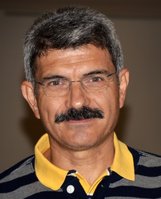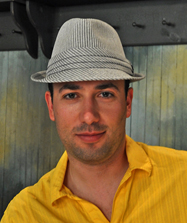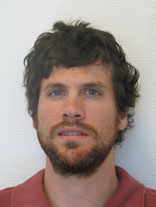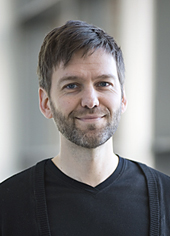 | Armin W. Geertz, Chair, Professor, Dr.Phil., Department of Culture and Society, Section for the Study of Religion, Aarhus University, Denmark Armin W. Geertz is Professor in the History of Religions. He was co-chair of the two-year research project “Religious Narrative, Cognition and Culture” and is currently chair of the four-year project “Religion, Cognition and Culture” (2004-2008) which since 2009 has become a permanent research unit under the Section of the Study of Religion. He is on the board of MIND Lab and is chair of the “Cognition and Culture” section of MINDLab.
He is also Founding Member (Secretary General 2006-2010, President Elect 2010-2012) of the International Association for the Cognitive Science of Religion (IACSR). His main interests are cognitive theory in the study of religion; the religions of indigenous peoples; recent developments in contemporary religiosity, and method and theory in the comparative study of religions.
He is co-editor (together with Jeppe Sinding Jensen) of the monograph series Religion, Cognition and Culture (Sheffield). He is Senior Editor of Journal for the Cognitive Science of Religion (Equinox Publishing). He has served as editor-in-chief of four monograph series in Danish and English on the study of religion and served on the board of eight international journals on the study of religion. He is the author of over 300 publications. Selected publications - (2004) “Cognitive Theories in the Study of Religion,” in New Approaches in the Study of Religion, edited by Peter Antes, Armin W. Geertz & Randi Warne, Berlin: de Gruyter 2004, vol. 2, 347-399.
- (2005) “Om religion og kognition - en forskningshistorisk og tematisk introduction,” [On Religion and Cognition: History of the Research and Thematic Introduction], Religionsvidenskabeligt tidsskrift 46, 2005, 5-26.
- (2008) Religiøs narrativitet, kognition og kultur, [Religious Narrative, Cognition and Culture], edited by Jeppe Sinding Jensen & Armin W. Geertz, Højbjerg: Forlaget Univers 2008.
- (2008) “Comparing Prayer: On Science, Universals and the Human Condition,” in Introducing Religion: Essays in Honor of Jonathan Z. Smith, edited by Willi Braun & Russell T. McCutcheon, London: Equinox 2008, 113-139.
- (2009) “New Atheistic Approaches to the Cognitive Science of Religion: On Daniel Dennett, Breaking the Spell (2006) and Richard Dawkins, The God Delusion (2006),” in: Contemporary Theories of Religion: A Critical Companion, edited by Michael Stausberg, New York: Routledge 2009, 242-263.
- (2009) “When Cognitive Scientists Become Religious, Science Is in Trouble: On Neurotheology from a Philosophy of Science Perspective,” Religion 39, 2009, 319-324.
- (2010) “Brain, Body and Culture: A Biocultural Theory of Religion,” Method and Theory in the Study of Religion 22, no. 4, 2010, 304-21.
- (2011) Religious Narrative, Cognition and Culture: Image and Word in the Mind of Narrative, edited by Armin W. Geertz & Jeppe Sinding Jensen, Sheffield: Equinox Publishing, 2011.
Personal homepage |
 | Jeppe Sinding Jensen, Coordinator, Associate Professor, Dr.Phil., Department of Culture and Society, Section for the Study of Religion, Aarhus University, Denmark Jeppe Sinding Jensen holds a BA in Classical Arabic and Islamic Culture (1978) and a BA & MA in the History of Religions (1982). For several years he worked on contemporary Islam, mostly from anthropological perspectives. He gradually changed research interest towards semiotics, methodology and the philosophy of science in the study of religion, especially in relation to comparative studies. His ‘Habilitationsschrift’ (2003) is an attempt to provide a theoretical foundation for comparative studies. Since around 1990 he has also taken an interest in cognitive studies of religion - as these support comparative endeavors - and lately he has been Founding Member of International Association for the Cognitive Science of Religion and Editor-in-chief of the monograph series Religion, Cognition and Culture (Sheffield). Selected publications - (2002) “The Complex Worlds of Religion: Connecting Cultural and Cognitive Analysis,” in: Current Approaches in the Cognitive Science of Religion, edited by Ilkka Pyysiäinen and Veikko Anttonen, London: Continuum 2002, 203-228.
- (2005) “Kognition og betydning,” [Cognition and Meaning], Religionsvidenskabeligt Tidsskrift 46, 2005, 63-76.
- (2008) Religiøs narrativitet, kognition og kultur, [Religious Narrative, Cognition and Culture], edited by Jeppe Sinding Jensen & Armin W. Geertz, Højbjerg: Forlaget Univers 2008.
- (2009) "Conceptual Models in the Study of Religion,” in The Oxford Handbook of the Sociology of Religion, edited by P.B. Clarke, Oxford: Oxford University Press 2009, 245-262.
- (2009) “Religion as the unintended product of brain functions in the ‘standard cognitive science of religion model’: on Pascal Boyer, Religion Explained (2001) and Ilkka Pyysiäinen, How Religion Works (2003),” in Contemporary Theories of Religion, edited by Michael Stausberg, London: Routledge 2009, 129-155.
- (2011) Religious Narrative, Cognition and Culture: Image and Word in the Mind of Narrative, edited by Armin W. Geertz & Jeppe Sinding Jensen, Equinox Publishing, Sheffield, 2011.
Personal homepage |
| Jesper Sørensen, MINDLab Associate Professor, Department of Culture and Society, Section for the Study of Religion, Aarhus University, Denmark Jesper Sørensen has a MA in the History of Religions (1996) focusing on a cognitive investigation of the use of metaphor as a persuasive strategy in the Theosophical Society and a PhD in the History of Religions focusing on cognitive underpinnings of magical rituals. He is currently involved in several projects investigating action representations and event-segmentation underlying ritual behavior as well as a project on the cognitive aspects of charisma and religious authority. He was formerly an International Fellow at the Institute of Cognition and Culture, Queen’s University, Belfast (2005-6) as well as an International Research Professor at the Memory and Development Lab, Washington University, St. Louis (2006). He has published widely on areas in the cognitive science of religion mainly focusing on ritual behavior in general and magic in particular. He is the author of the AltaMira Press book A Cognitive Theory of Magic (2006). He is a founding member of the International Association for the Cognitive Science of Religion (IACSR). Selected publications - (2005) “Charisma, Tradition, and Ritual,” in Mind and Religion, edited by H. Whitehouse & R.N. McCauley, Walnut Creek: AltaMira Press 2005, 167-186.
- (2006) A Cognitive Theory of Magic, Walnut Creek: AltaMira Press 2006.
- (2006) “Agents and Instruments in Judgements of Ritual Efficacy,” together with P. Liénard and C. Feeny. Journal of Cognition and Culture 6, nos. 3-4, 2006, 463-482.
- (2007) “Acts that Work,” Method and Theory in the Study of Religion 19, nos. 3-4, 2007, 281-300.
- (2007) “Ideernes epidemiologi og kulturens immunologi,” [The Epidemiology of Ideas and the Immunology of Culture], Tidsskriftet Antropologi 53, 2007, 5-16.
- (2007) “Malinowski and Magical Ritual,” in Religion, Anthropology, and Cognitive Science, edited by H. Whitehouse & J. Laidlaw. Durham, NC: Carolina Academic Press 2007, 81-104.
- (2008) “Cognition and Religious Phenomena,” Temenos 44, no. 1, 2008, 111-122.
- (2008) “Magic among the Trobrianders,” Cognitive Semiotics 3, 2008, 36-64.
- (2011) Past Minds: Studies in Cognitive Historiography, edited by Luther H. Martin & Jesper Sørensen. London: Equinox Publishing 2011.
Personal homepage |
|
| Merlin Donald, Distinguished Fellow, Professor Emeritus, Department of Psychology, and Faculty of Education, Queen’s University, Kingston, Ontario, Canada, Adjunct Professor, Department of Culture and Society, Section for the Study of Religion, Aarhus University Merlin Donald is a cognitive neuroscientist with a background in philosophy, he is the author of many scientific papers, and two influential books: Origins of the Modern Mind: Three stages in the evolution of culture and cognition (Harvard, 1991), and A Mind So Rare: The evolution of human consciousness (Norton, 2001).
His PhD was obtained from McGill University in 1968, and he spent four and a half years associated with the Yale University School of Medicine, first as an NRC postdoctoral fellow, and then as a Research Neuropsychologist. He has been at Queen’s University since 1972, and during that time, he has also been a visiting professor at University College, London; Harvard University; UCSD; Stanford University; and elsewhere. He was also founding chair of a new Department of Cognitive Science at Case Western Reserve University in Ohio, and remains on faculty there as Adjunct Professor. He has been a Visiting Fellow at the Center for Advanced Studies in the Behavioural Sciences, at Stanford, California, and a Killam Research Fellow. He was elected a Fellow of the Canadian Psychological Association in 1984, and a Fellow of the Royal Society of Canada in 1995. He was recently (2006) elected a Fellow of the World Academy of Art & Science.
Professor Donald is in considerable demand as an academic lecturer, having delivered, among others, the Donald Olding Hebb Lecture at McGill University, the William Bennett Munro Memorial Lecture at Caltech, the Walter Morris Philosophy of Science Lecture at the University of Arkansas for Medical Sciences, the Crowder Lecture at Yale University, and served as invited lecturer at the World Forum of Cultures in Barcelona, Spain, and the European Forum in Alpbach, Austria.
In 1997, a conference held at the University of Cambridge, UK, was dedicated to the pioneering work of Professor Donald on human cognitive origins. In his introduction to the book, Cognition and Material Culture , that followed from that conference, the noted British archaeologist Colin Renfrew wrote: “Merlin Donald’s Origins of the Modern Mind (1991) may be regarded as the most coherent statement which we yet have concerning the development of human cognitive abilities.” He is currently working on a book on the topic of “Cognitive Governance.” Personal homepage |
 | Joseph Bulbulia, Distinguished Fellow, Senior Lecturer, Victoria University, Wellington, New Zealand
Joseph Bulbulia took degrees at Holy Cross, and Harvard University, before receiving his PhD from Princeton University in 2001. He lives in Wellington New Zealand, where he is a Senior Lecturer in the Religious Studies Department at Victoria University. He is interested in how religious practices variously modulate social memory, prediction, and interaction. He considers the cognitive science of religion to sit at the borders of social neuroscience, philosophy, economics, and evolutionary biology. His particular research interests are in evolutionary psychology of religion, philosophy of religion, religion and the emotions, and ritual theory. His current research focusses on signaling theory and the evolution of religious cooperation. Selected publications - (2008) “Meme Infection or Religious Niche Construction? An Adaptationist Alternative to The Cultural Maladaptationist Hypothesis,” Method and Theory in the Study of Religion 20, 2008, 1-42
- (2008) “Religious Solidarity: The Hand Grenade Experiment,” Journal of Cognition and Culture 8, nos. 3-4, 2008, 295-320. (Supplemental Figure: game explained in sequential form on personal website)
- (2008) The Evolution of Religion: Studies, Theories, & Critiques, edited by Joseph Bulbulia, Richard Sosis, Erica Harris, Russell Genet, Cheryl Genet, and Karen Wyman, Santa Margarita: Collins Foundation Press, 2008.
- (2008) “Free Love: Religious Solidarity on the Cheap,” in The Evolution of Religion: Studies, Theories, & Critiques, edited by Joseph Bulbulia et al., Santa Margarita: Collins Foundation Press, 2008, 153-160.
- (2008) “Introduction: Religion in Eden,” by Richard Sosis & Joseph Bulbulia, in The Evolution of Religion: Studies, Theories, & Critiques, edited by Joseph Bulbulia et al., Santa Margarita: Collins Foundation Press, 2008, 15-19.
- (2009) “Religiosity as Mental Time-travel: Cognitive Adaptations for Religious Behavior,” in The Believing Primate: Scientific, Philosophical and Theological Perspectives on the Evolution of Religion, edited by J. Schloss & M. Murray, New York: Oxford University Press, 2009, 44-75.
- (in press) “Why ‘costly-signalling’ models of religion require cognitive psychology,” in Origins of Religion, Cognition, and Culture, edited by Armin W. Geertz, Sheffield: Equinox.
Personal homepage |
 | Pascal Boyer, Distinguished Fellow, Henry Luce Professor of Individual and Collective Memory at Washington University in St. Louis, Adjunct Professor, Department of Culture and Society, Section for the Study of Religion, Aarhus University
Pascal Boyer works in the Memory and Development Laboratory of the Psychology Department, Washington University. He also manages the Luce Program in Individual and Collective Memory. He is the author of scientific articles and a number of influential books, among others The Naturalness of Religious Ideas: A Cognitive Theory of Religion (Berkeley, 1994) and Religion Explained: The Evolutionary Origins of Religious Thought (New York, 2001). His research is aimed at describing neuro-cognitive systems that [a] are part of the normal make-up of human minds as a result of evolution by natural selection and [b] support the acquisition of cultural knowledge, concepts and norms. A good part of this research consists in experimental studies of adults and young children in natural and lab contexts. Current studies focus on anxiety and ritual behavior, on source memory and on early numerical capacities. Selected publications - (2006) “Whence Collective Ritual? A Cultural Selection Model of Ritualized Behavior,” by Lienard, P. & Boyer, P., American Anthropologist 108, 2006, 814-827.
- (2006) “Why Ritualized Behavior? Precaution Systems and Action-Parsing in Developmental, Pathological and Cultural Rituals,” by Boyer, P., & Lienard, P., Behavioral and Brain Sciences 29, 2006, 1-56.
- (2008) “Evolutionary Economics of Mental Time-Travel?” Trends in Cognitive Sciences 12, no. 6, 219-223.
- (2008) “Evolutionary Perspectives on Religion,” by Boyer, P. & Bergstrom, B., Annual Review of Anthropology 37, 2008, 111-130.
- (2008) “Ritual Behavior in Obsessive and Normal Individuals. Moderating Anxiety and Reorganizing the Flow of Behavior,” by Boyer, P. & Lienard, P., Current Directions in Psychological Science 17, no. 4, 2008, 291-4.
- (2008) “Religion: Bound to Believe?” Nature 455, 2008, 1038-39.
- (2010) “Why Evolved Cognition Matters to Understanding Cultural Variation Interdisciplinary,” Science Reviews 35, nos. 3-4, 2010, 377-87.
- (2010) “Pragmatic and idiosyncratic acts in human everyday routines: The counterpart of compulsive rituals,” by Keren H., Boyer P., Mort J. & Eilam D., Behavioural Brain Research 212, 2010, 90-95.
Personal homepage |
 | Luther H. Martin, Distinguished Fellow, Professor Emeritus, Department of Religion, The University of Vermont
Professor Martin specializes in the study of Hellenistic (Graeco-Roman) religions as well as in theoretical and methodological issues in the study of religion. In addition to graduate study at Universitäts Göttingen and post-graduate study at the American School of Classical Studies in Athens, Yeshiva University in New York City and the American Academy in Rome, he holds advanced degrees from Drew University (1962, 1963) and the Ph.D. from Claremont Graduate School (1972). He is a member and active participant in the American Academy of Religion, the Society for Biblical Literature, the Society for the Scientific Study of Religion, the International Association for the History of Religions, and the North American Association for the Study of Religion of which he is a founding member. He is furthermore Past President of the International Association for the Cognitive Science of Religion (IACSR) of which he is a founding member. He was Professor of Religion at the University of Vermont where he taught for over thirty years. He served as chair of the department from 1978-1991, was named a University Scholar in 1993-1994, and was the founder and first director of the John Dewey Honors Program of the College of Arts and Sciences from 1994-1996. His publications include: Hellenistic Religions: An Introduction (Oxford University Press, 1967), six edited volumes of essays on aspects of theory and method in the study of religion including, most recently, Theoretical Frameworks for the Study of Graeco-Roman Religions (University Studio Press, 2003), and over 50 scholarly articles and 35 reviews in his field as well as contributions to various dictionaries and encyclopedias. He currently serves on the editorial boards of Historical Reflections/Reflexions Historiques, Method & Theory in the Study of Religion, and Studies in Religion/Sciences Religieuses, and he is co-editor of the series Cognitive Science of Religion (formerly AltaMira Press, currently Berlin Academic). He is also Distinguished International Fellow at the Institute for Cognition and Culture in Belfast.
His approach to the study of religion is historical and comparative as formulated theoretically according to scientific (academic) principles. He is currently interested in the empirical researches of cognitive psychologists and in social theory, especially as these are related to each other and as they may be tested by and be applied to historical and anthropological data. Selected publications - (2003) Theorizing Religions Past: Archaeology, History, and Cognition, edited by Luther H. Martin and Harvey Whitehouse, Walnut Creek, CA: AltaMira Press, 2004.
- (2004) Hellenisation, Empire and Globalisation: Lessons from Antiquity, edited by Panayotis Pachis and Luther H. Martin, Thessaloniki: Vanias Press, 2004.
- (2005) “Cognitive Science of Religion,” in The Routledge Companion to the Study of Religion, edited by John Hinnells, London: Routledge, 2005; rev. 2nd ed., in press.
- (2007) “The Promise of Cognitive Science for the Historical Study of Religions, with Reference to the Study of Early Christianity,” in: Explaining Early Judaism and Christianity: Contributions from Cognitive and Social Sciences, edited by Petri Luomanen, Ilkka Pyysiäinen and Risto Uro, Leiden: E. J. Brill, 2007.
- (2008) “Can Religion Really Evolve? (And What Is It Anyway?),” in: The Evolution of Religion: Studies, Theories, & Critiques, edited by Joseph Bulbulia et al., Santa Margarita: Collins Foundation Press, 2008.
- (2009) Imagistic Traditions in the Graeco-Roman World: A Cognitive Modeling of History of Religions Research, edited by Luther H. Martin and Panayotis Pachis, Thessaloniki: Vanias Press, 2009.
- (2011) Past Minds: Studies in Cognitive Historiography, edited by Luther H. Martin & Jesper Sørensen. London: Equinox Publishing 2011.
- (2011) “Evolution, Cognition, and History”, in Past Minds: Studies in Cognitive Historiography, edited by Luther H. Martin and Jesper Sørensen, London: Equinox 2011.
- (2012) “Origins of Religion, Cognition and Culture: The Bowerbird Syndrome,” in: The Origins of Religion, Cognition and Culture, edited by Armin W. Geertz, Sheffield: Equinox, in press.
- (in preparation) “The Deep History of Religious Ritual”, in Ritual, Cognition and Culture, edited by Jesper Sørensen and Armin W. Geertz, Sheffield: Equinox, in preparation.
Personal homepage |
 | Donald Wiebe, Distinguished Fellow, Professor, Department of Study of Religion and Trinity College, University of Toronto
Professor Wiebe’s primary areas of research interest are philosophy of the social sciences, epistemology, philosophy of religion, the history of the academic and scientific study of religion, and method and theory in the study of religion. He has served with distinction in his capacities as Professor as well as Dean and Vice-Provost of the Faculty of Divinity and the Faculty of Arts at Trinity College. He was, furthermore, Associate Director of the Centre for the Study of Religion at the University of Toronto. He has served as Congress Director of two world congresses of the International Association for the History of Religions (IAHR) in 1980 and 2010. He has served as a member of the Executive Committee of the IAHR (1985-1995 and Treasurer 1995-1998). He is Honorary Life Member of the IAHR.
Professor Wiebe is the author of Religion and Truth: Towards and Alternative Paradigm for the Study of Religion (1981), The Irony of Theology and the Nature of Religious Thought (1991), Beyond Legitimation: Essays on the Problem of Religious Knowledge (1994), and The Politics of Religious Studies: The Continuing Conflict with Theology in the Academy (1999). He has edited several books and sets of congress proceedings, and edits the series TORONTO STUDIES IN RELIGION for Peter Lang Press. In 1985 Dr. Wiebe, with Luther H. Martin and E. Thomas Lawson, founded the North American Association for the Study of Religion which became affiliated to the IAHR in 1990; he twice served as President of that Association (1986-87, 1991-92). He was, furthermore, founding member of the International Association for the Cognitive Science of Religion (IACSR). Selected publications - (2004) Critical Reflections on the ‘Modes of Religiosity’ Argument, in Theorizing Religions Past, edited by Harvey Whitehouse and Luther H. Martin, Lanham MD, Altamira Press, 2004, 197-213.
- (2004) Implications of the ‘Modes of Religiosity Theory’ for the Scientific Study of Religion, Method and Theory in the Study of Religion 16, 2004, 234-240.
- (2008) Does Talk About the Evolution of Religion Make Sense? in: The Evolution of Religion: Studies, Theories, & Critiques, edited by Joseph Bulbulia et al., Santa Margarita: Collins Foundation Press, 2008, 339-346.
- (2008) Science, Scholarship, and the Domestication of Religion: On Dennett’s Breaking the Spell, Method and Theory in the Study of Religion 20, 2008; 54-60.
- Roots in the Brain: on David Lewis-Williams and Davide Pearce, Inside the Neolithic Mind, in Contemporary Theories of Religion: A Critical Companion, edited by Michael Stausberg, London: Routledge, 2009, 195-208.
- (2010) Chasing Down Religion: In the Sights of History and the Cognitive Sciences. Essays in Honour of Luther H. Martin, edited by Panayotis Pachis and Donald Wiebe, Thessaloniki, Barbounakis Publications, 2010.
- (2010) Beneath the Surface of History, in Past Minds: Studies in Cognitive Historiography, edited by Luther H. Martin and Jesper Sørensen, London: Equinox, 2010, 167-177.
- (forthcoming) The Significance of the Natural Experience of a ‘Non-Natural’ World to the Question of the Origin of Religion, in Religion, forthcoming.
- (forthcoming) Religious Studies as a Scientific Discipline: The Persistence of a Delusion, Luther H. Martin and Donald Wiebe.
- (in preparation) Proceedings of the XXth World Congress of the International Association for the History of Religions, edited by Donald Wiebe, Toronto: Institute for the Advanced Study of Religion.
Personal homepage |
 | Donald M. Braxton, Distinguished Fellow, J Omar Good Professor of Religious Studies, Chair, Department of Religious Studies, Juniata College, Huntingdon, Pennsylvania, USA
Donald M. Braxton is a native of the mid-Atlantic region of the United States. He received his B.A. from Wittenberg University, and his A.M. and Ph.D. from the University of Chicago. His work is in the area of the evolution of religion, with a particular interest in the applications of information theory and computer modeling for evolutionary explanations of religion. He serves on the board of IRAS (Institute on Religion in an Age of Science) and publishes often in its journal Zygon. His research is in the field of simulating religious behavior utilizing multi-agent platforms. While in Aarhus, he is working on modeling triggers for religiously motivated violence, the cognitive consequences of public display and treatment of dead bodies, the minimal frequency requirements for HADD activations, and environmental cues for religious cognition (so-called distributed cognition). Selected publications - (2004) “Certainty and Self-Deception among American Fundamentalists,” The Metanexus Digest 4, no. 14, 2004.
- (2005) “The Legacy of Violence in the Abrahamic Traditions: An Evolutionary Explanation,” The Fourth R, January 2005.
- (2006) “Naturalizing Transcendence in the New Cosmologies of Emergence,” Zygon 41, no. 2, 2006, 347-364.
- (2007) “Religious Naturalism and the Future of Christianity,” Zygon 42, no. 2, June 2007, 317-342.
- (2008) “Policing Sex: Explaining Demons in the Cognitive Economies of Religion,” Journal of Cognition and Culture 8, nos. 1-2, 2008, 117-134.
- (2009) “Beyond Sui Generis Religion: When Neither Eliade Nor Postmodernism Suffice,” Zygon 44, no. 2, 2009.
- (forthcoming) “Modeling the McCauly-Lawson Ritual Form Hypothesis,” in Religious Ritual, Cognition, and Culture, edited by Jesper Sørensen & Armin W. Geertz, Sheffield: Equinox, (forthcoming).
Personal homepage |
 | Ann Taves, Distinguished Fellow, Professor of Religious Studies, Virgil Cordano OFM Chair in Catholic Studies, Department of Religious Studies, University of California Santa Barbara, USA
The focus of Ann Taves’ research has shifted from answering historical questions about religion to using historical materials to explore how people make sense of ambiguous events and experiences that inhabit the indeterminate space between imagination and reality, craziness and inspiration, fiction and faith. In exploring these processes, she works comparatively to generate the detailed descriptive analyses favored by scholars of religion and to explore the naturalistic explanations developed by researchers in the social and natural sciences. Ann Taves has published numerous scientific articles and several influential books, among them Fits, Trances and Visions: Experiencing Religion and Explaining Experience from Wesley to James (Princeton, 1999) and Religious Experience Reconsidered: A Building-Block Approach to the Study of Religion and Other Special Things (Princeton, 2010), which was Winner of 2010 Distinguished Book Award, Society for the Scientific Study of Religion and one of Choice's Outstanding Academic Titles for 2010.
As a faculty participant in the graduate Emphasis in Cognitive Science, she teaches courses that focus specifically on topics in the evolutionary and cognitive science of religion and others that integrate that approach alongside others. She draws particularly from research on situated cognition (embodied and embedded) in order to understand the connections between cognitive and cultural processes. She is interested in how people use cognitive schemas to structure the transmission of ideas and practices, the way that people use things (people and objects) they perceive as special to enable them to behave in new ways, and why people perceive some things as more special than others. Selected publications - (2006) “Where (Fragmented) Selves Meet Cultures: Theorizing Spirit Possession,” Culture and Religion 7, no. 2, 2006, 123-38.
- (2008) “Ascription, Attribution, and Cognition in the Study of Experiences Deemed Religious,” Religion 38, no. 2, 2008, 125-40.
- (2009) “Channeled Apparitions: On Visions That Morph and Categories That Slip,” Visual Resources 25, no. 1, 2009, 141-56.
- (2009) “William James Revisited: Rereading the Varieties of Religious Experience in Transatlantic Perspective,” Zygon 44, no. 2, 2009, 415-32.
- (2009) Religious Experience Reconsidered: A Building Block Approach to the Study of Religion and Other Special Things. Princeton: Princeton University Press, 2009.
- (2010) “No Field is an Island: Fostering Collaboration Between the Academic Study of Religion and the Sciences,” Method and Theory in the Study of Religion 22, 2010, 170-188.
Personal homepage |
 | Panayotis Pachis, Distinguished Fellow, Professor, Religious Studies, Aristotle University, Thessaloniki, Greece
Professor Panayotis Pachis is co-editor of Theoretical Frameworks for the Study of Graeco-Roman Religions (2002), Hellenisation, Empire and Globalisation: Lessons from Antiquity (2004) and Imagistic Traditions in the Graeco-Roman World: A Cognitive Modeling of History of Religious Research (2009). Selected publications - (2004) Hellenisation, Empire and Globalisation: Lessons from Antiquity, edited by Luther H. Martin and Panayotis Pachis, London: Equinox Publishing 2004.
- (2009) Imagistic Traditions in the Graeco-Roman World: A Cognitive Modeling of History of Religions Research, edited by Luther H. Martin and Panayotis Pachis, London: Equinox Publishing 2009.
- (2010) Religion and Politics in the Graeco-Roman World: Redescribing the Isis-Sarapis Cult, London: Equinox Publishing 2010.
- (in preparation) “Data from Dead Minds? Dream and Healing in the Isis/Sarapis Cult during the Graeco-Roman Age,” in Data from Dead Minds, edited by Roger Beck and Luther H. Martin, Sheffield: Equinox Publishing (in preparation).
- (in preparation) “‘Inducting in the mystery’ of ‘star-talk’: The case of Isis cult during the Graeco-Roman Age,” in Connecting History, Astrology and Cognition: Roger Beck’s The Religion of the Mithras Cult in the Roman Empire, edited by Aleš Chalupa (in preparation).
Personal homepage |
 | Uffe Schjødt, MINDLab Postdoc Research fellow, Department of Culture and Society, Section for the Study of Religion, and the Centre of Functionally Integrative Neuroscience (CFIN), Aarhus University, Denmark
His research fields include: Cognitive Science of Religion, Psychology of Religion, Experimental Cognitive Neuroscience. Areas of interest: Social cognition, executive processing, emotion, and embodiment in religious thought and behaviour. Current projects are: Experiments at the MR Research Centre, Aarhus University Hospital investigating the neural substrates of various forms of praying and the neural processes involved in charismatic authority. Selected publications - (2007) “Homeostasis and religious behavior,” Journal of Cognition and Culture 7, no. 3, 2007, 313-340.
- (2008) “Rewarding Prayers,” together with Hans Stødkilde-Jørgensen, Armin W. Geertz & Andreas Roepstorff, Neuroscience Letters 443, 2008, 165-168.
- (2008) “Evolutionary psychology, Neuroscience and the Study of Religion,” in The Evolution of Religion, edited by Joseph Bulbulia et al., Santa Margarita: Collins Foundation Press 2008, 303-311.
- (2009) “Highly religious participants recruit areas of social cognition in personal prayer,” together with Hans Stødkilde-Jørgensen, Armin W. Geertz & Andreas Roepstorff, Social Cognitive and Affective Neuroscience (SCAN) 4, no. 2, 2009, 199-207.
- (2009) The Neural Substrates of Prayer: Toward an experimental neuroscience of religion, PhD Dissertation, Faculty of Theology, Aarhus University.
- (2009) “The Religious Brain,” Method and Theory in the Study of Religion 21, no. 3, 2009, 310-339.
- (2010) “The Power of Charisma -- Perceived Charisma Inhibits the Frontal Executive Network of Believers in Intercessory Prayer,” together with Hans Stødkilde-Jørgensen, Armin W. Geertz, Torben E. Lund & Andreas Roepstorff, Social Cognitive and Affective Neuroscience (SCAN) 6, 2011, 119-127.
Personal homepage |
 | Dimitris Xygalatas, MINDLab Postdoc, Research Fellow, Department of Culture and Society, Section for the Study of Religion and Section for Anthropology, Aarhus University
He received his PhD from the Institute of Cognition and Culture, Queen's University Belfast, and has held postdoctoral positions at the universities of Aarhus (2007-2008) and Princeton (2008-2009). He is interested in extreme rituals and their effects on both the individual and the social level. He has conducted fieldwork in Greece, Bulgaria, and Spain, where he studied the performance of fire-walking rituals, combining ethnographic and experimental methods. In 2008, Dimitris and Uffe Schjødt organized an international interdisciplinary project to study the performance of a fire-walking ritual in the Spanish village of San Pedro Manrique. Using physiological measurements alongside ethnographic methods, this project brought together scholars from several countries and disciplines in order to answer a series of questions about such high-arousal rituals. At the end of 2009, Dimitris and Else-Marie E. Jegindø are leaving for Mauritius, where they will conduct a long-term experimental anthropological study of certain painful Hindu rituals such as the Thaipusam and the Teemeedee. Dimitris is a founding member and Internet Officer of the International Association for the Cognitive Science of Religion (IACSR), Managing Editor of the Journal for the Cognitive Science of Religion (Equinox Publishing), and a founding member and Treasurer of the Greek Society for the Study of Culture and Religion (G.S.S.C.R.) His forthcoming book, The Burning Saints: Emotion and Motivation in Greek Fire-Walking Rituals, will be published in the series "Religion, Cognition, and Culture", by Equinox Publishing.
Areas of interest: Anthropology, Ethnography, Religion, Ritual, Cognition, Evolution, Experimental methods. Geographical areas: Southern Europe (Greece, Bulgaria, Spain), Indian Ocean (Mauritius, Réunion) He speaks Greek, English, Spanish, Italian and French. Selected publications - (2008) “Fire-walking and the Brain: The Physiology of High-Arousal Rituals,” in The Evolution of Religion: Studies, Theories, & Critiques, edited by Joseph Bulbulia et al., Santa Margarita: Collins Foundation Press 2008, 189-195.
- (2010) “Can the Study of Religion be Scientific?” in Chasing Down Religion: In the Sights of History and the Cognitive Sciences. Essays in Honour of Luther H. Martin, edited by D. Wiebe & P. Pachis, Thessaloniki: Barbounakis, 2010, 531-549.
- (2011) “Ethnography, Historiography, and the Making of History in the Tradition of the Anastenaria,” History and Anthropology 22, no. 1, 2011, 57-74.
- (2011) “Synchronized arousal between performers and related spectators in a fire-walking ritual,” by I. Konvalinka, D. Xygalatas, J. Bulbulia, U. Schjødt, E-M. Jegindø, S. Wallot, G. Van Orden, & A. Roepstorff, Proceedings of the National Academy of Sciences, early edition, 2011, 1-6.
- (2011) “Quantifying collective effervescence: Heart-rate dynamics at a fire-walking ritual,” by D. Xygalatas, I. Konvalinka, J. Bulbulia, & A. Roepstorff, Communicative & Integrative Biology 4, no. 6, 2011.
- (in press) “Fire-walking in the Balkans: High Arousal Rituals and Memory”, in Changing Minds: Religion and Cognition through the Ages, edited by Istvan Czachesz & Tamas Bíró, Groningen Studies in Cultural Change Series, Leuven: Peeters (in press since 2010).
- (in press) The Burning Saints: Emotion and Motivation in the Fire-walking Rituals of the Anastenaria, Sheffield: Equinox Publishing, Ltd., 2012 (in press).
- (forthcoming) Mental Culture: Towards a Cognitive Science of Religion, edited by Dimitris Xygalatas & William L. McCorkle, Jr., Sheffield: Equinox Publishing, Ltd. (forthcoming).
Personal homepage |
 | Gabriel Levy, Research Fellow, Department of Culture and Society, Section for the Study of Religion, Aarhus University
Gabriel Levy has a BA in Anthropology and Religion from Dartmouth, and his MA and PhD in Religious Studies from the University of California, Santa Barbara. His research area is primarily Judaism, and particularly the Hebrew Bible. His honors thesis at Dartmouth was an ethnography of a Hasidic community in Miami Beach, while his MA was an analysis of religious genius as represented in the Talmud.
His PhD dissertation examined the emergence and history of Biblical prophecy in light of the cognitive effects of literacy. His present work continues to examine the cognitive effects of literacy on religion and the study of religion, but is especially interested in thinking through the way technology materially extends cognition. Over this time he has had a continued interest in the philosophy of language, and in particular how semantics is materially embodied in both brain physiology and intersubjective triangulation. Link to CV |
 | Quentin Atkinson, Postdoc, Institute of Cognitive and Evolutionary Anthropology, Oxford University, UK Quentin Atkinson has a background in psychology and evolutionary biology. His research uses computational models of genetic and cultural evolution to answer questions about the spread of people and culture. His work covers the origin and evolutionary dynamics of language, human cooperation and religion, as well as the human expansion from Africa. Quentin's work at the University of Aarhus is part of the Explaining Religion (EXREL) project, funded by the European Commission, an interdisciplinary research project that seeks to understand both what is universal and cross-culturally variant in religious traditions as well as the cognitive mechanisms that undergird religious thinking and behavior. Personal homepage |
Current PhD Fellows |

| Else-Marie E. Jegindø, PhD fellow, Department of Culture and Society, Section for the Study of Religion, Centre of Functionally Integrative Neuroscience, and The Danish Pain Research Center, Aarhus University and Aarhus University Hospital, Denmark Else-Marie holds a MA in the Study of Religion and Philosophy. Her PhD project is an interdisciplinary approach to the study of religious coping strategies and explores how religious practice modulates pain perception, both clinically and "in the wild". Her research project is primarily empirical and combines a wide range of different measures, e.g. clinical pain assessment, psychometrics, psychophysiological measures and functional neuroscience. She is particularly interested in how religious, cultural and psychological beliefs interrelate with physiological processes, i.e brain and body. Fields of research: cognitive science of religion, clinical pain research, experimental neuroscience, psychology of religion. Research interests: religious coping, religious behavior, high arousal rituals and pain, cognitive neuroscience, placebo mechanisms, philosophy of language. In 2010 Else-Marie and Dimitris Xygalatas will be organizing a field work expedition to Mauritius during the Thaipusam Festival in order to investigate the neurophenomenological mechanisms of this extreme ritual. Personal homepage |
 | Lars Madsen, PhD fellow, Department of Culture and Society, Section for the Study of Religion, Aarhus University, Denmark Lars Madsen holds a MA in The Study of Religion and Philosophy. His studies have centred on the philosophy of religion and the philosophy of language with Søren Kierkegaard, Rudolf Otto, Augustine and especially Ludwig Wittgenstein as focal points. His current research project seeks to provide a philosophical grounding for a social conception of the cognitive science of religion. The project couples the notion of a socially founded normativity in Ludwig Wittgenstein’s later philosophy with recent culturally oriented theories of cognition by Merlin Donald and Michael Tomasello. Personal homepage |
 | Panagiotis Mitkidis, PhD Fellow, Department of Culture and Society, Section for the Study of Religion, Aarhus University, Denmark Panagiotis Mitkidis holds a joint MA in Cognitive Science and the Study of Religion from Aristotle University at Thessaloniki and Aarhus University in Denmark, and a degree in the Study and History of Religion from Aristotle University. He has also studied Cognitive Semiotics at the Center of Semiotics in Aarhus and Social Anthropology and Ethnography at a Master level. He has worked as a Research Assistant at the Department for Study of Religion, Aarhus University and he is a Founding Member of the International Association for the Cognitive Science of Religion (IACSR). Currently, he is a Ph.D. fellow at the Center for Contemporary Religion and the Religion, Cognition and Culture (RCC) Research Unit. His main research interests lie in the field of Game Theoretical approaches to Ritual, Authority, and the Sacred. Along with his supervisor Jesper Sørensen and his co-supervisors, he is organizing an international interdisciplinary research project to relate and evaluate ritualistic action and ordinary action in relation to trust, cooperation, and group cohesion, to analyze the power of authority and expertise, and to quantify the notion and formulation of the sacred. Using tools from the Behavioral Economics together with Developmental and Evolutionary Psychology, the project will try to provide evidence for a series of questions about behavior and group cohesion. Personal homepage |
 | Kristoffer Laigaard Nielbo, PhD fellow, Department of Culture and Society, Section for the Study of Religion, Aarhus University, Denmark Kristoffer has a BA in Science of Religion and Philosophy from Copenhagen and has studied Cognitive Semiotics at the Center of Semiotics in Aarhus. His current research project explores the subjective and meaningful experience of enacting ritualized behavior in a religious context. He is especially interested in the use of a computational approach – artificial neural networks - to investigate this experiential and semiotic aspect of religious agents’ behavior. His field of research includes cognitive and empirical semiotics, phenomenology of action, and theories of ritual/ritualized behavior with a cognitive and ethological orientation. He is interested in issues of ritual meaning, online cognition, and enactment. Personal homepage |
 | Ella Paldam, PhD fellow, Department of Culture and Society, Section for the Study of Religion, Aarhus University Ella has a BA in the study of religion from Aarhus and has received extensive training in qualitative and quantitative research methods. Her PhD project on California Indians investigates how indigenous tradition is constructed and maintained through religious beliefs and practices. In 2010 she did her field work among the Chumash Tribe in the Santa Barbara area. The project focuses on the Bear Ceremony which is the core common ritual of a highly heterogeneous new religious movement among California Indians.
Besides her PhD project, Ella studies the role of expectation in charismatic healing in a Danish Christian context. In this project, a large archival material has been coded into an extensive database with more than 800 cases of healing through intercessory prayer. Personal homepage |
 | Olympia Panagiotidou, PhD Fellow, Aristotle University at Thessaloniki and Department of Culture and Society, Section for the Study of Religion, Aarhus University, Denmark She holds a joint MA in Cognitive Science and the Study of Religion from Aristotle University at Thessaloniki and Aarhus University in Denmark, and a BA in the History and Archaeology from Aristotle University. Her current project focuses on the healing of diseases in the temples of Asklepios and how people think about and explain their experiences in his sanctuaries. This project applies cognitive approaches in the analysis of the cult of Asklepios. The application of research in neurobiology and cognitive sciences of religion and health, pain and prayer, dream research and the on-going research on placebo, art and religious behavior is expected to throw light on the potential cognitive capacities and micro-processes, which may have taken place in both the minds and bodies of the god’s worshippers resulting in the apparent healing of their diseases. They might also explain the implicit conceptions and concepts that led people to seek cures in the sanctuaries of Asklepios, and to propagate the power of the god. Her field of research includes the application of current cognitive theories on ancient Greek cults. |
Past PhD Fellows |
 | Gretchen Koch, PhD fellow, Aarhus University, Denmark
Gretchen Koch's background is in philosophy of religion, and she is analyzing research from developmental and moral psychology to explore possible cognitive foundations for belief in souls, and the role which that belief plays in moral reasoning. She is particularly interested in the conditions under which practice of empathy may be stimulated or inhibited, and the ways in which narratives concerning the soul may be invoked in post hoc moral justification.
Gretchen Koch has a BA in Religious Studies from Texas Christian University, an MA from the Centre for Religion, Culture, and Gender at the University of Manchester and a PhD from the Department of the Study of Religion, Aarhus University.
Personal homepage |
 | Jesper Østergaard, PhD fellow, Department of Culture and Society, Section for the Study of Religion, Aarhus University, Denmark Jesper Østergaard holds a MA in the Study of Religion and Semiotics and a PhD in the Study of Religion, Aarhus University. During his studies he worked with different topics such as cultural models, internalisation, religious narratives, branding, tourism, conceptual integration with material anchor, cognitive theories on ritual, pilgrimage, Tibetan religion and theories on space, place and landscape. His research fields include cognitive science of religion, externalism, anthropology of religion, Tibetan religion, pilgrimage in different traditions, techniques of the body and the spatial and topographic turn in the humanities. Current project focuses on the relationship(s) between landscape and cognition in Tibetan pilgrimage. It connects theories from cognitive science, i.e. externalism, with a focus on the concrete landscape, i.e. the topographic turn, to analyse how the landscape is integrated as cognitive scaffolding in the pilgrim’s cognitive process. Personal homepage |



















